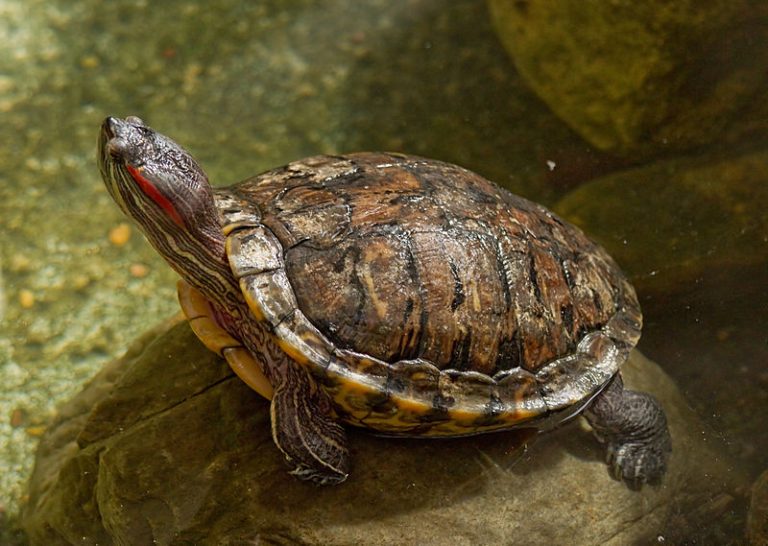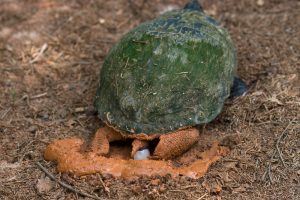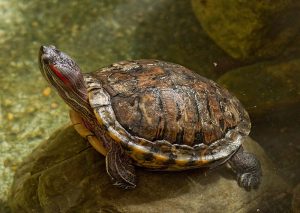
Red-eared slider turtle.
Photo by Greg Hume, WikiMedia Commons under CC BY-SA 3.0 license.
Table of Contents
Imagine a child inside a womb with a sex yet to be decided not by the pair of sex chromosomes but by the ambient temperature – well, that is how the sex of red-eared slider turtle (Trachemys scripta elegans) and other reptile species is determined. Whether the baby red-eared slider turtle develops into a male or female will depend on the ambient temperature of the nest. The eggs hatching from a cooler nest will be males whereas those in a warmer nest will be females. Nevertheless, scientists recently identified the molecular basis associated with the temperature-dependent sex determination in red-eared slider turtle.
Temperature-dependent sex determination in red-eared slider turtle
In humans, the sex of the offspring is determined by the pair of chromosomes inherited from the parents. At fertilization, the sex of the embryo is already determined. A female embryo would have two X chromosomes whereas a male embryo would have X and Y chromosomes. This mechanism of sex-determination is referred to as genotypic sex determination (GSD). This is also how the sex of many animals, including certain reptiles, is determined. Another mechanism is temperature-dependent sex-determination (TSD). It is when the temperature predicts the sex of the developing embryo. This is observed in many reptiles, such as crocodiles, alligators, and turtles. In red-eared slider turtle, for instance, their sex can be predicted depending on the incubation temperature. There is a critical period during which the embryonic development is thermosensitive. The eggs hatching from cooler nests will all be males whereas those hatching from warmer nests will all be females.1
Molecular basis of sex-determination in red-eared slider turtle

Photo by Nephets, WikiMedia Commons under CC BY-SA 3.0 license.
How the temperature causes the baby red-eared slider turtle to turn into male or female is a long-time enigma. The phenomenon of TSD was observed for more than 50 years ago and since then scientists have attempted to dig further into the molecular level of TSD. Are there genes involved in the process, and if there are, which genes? Researchers from Duke University and Zhejiang Wanli University in China published their study on red-eared slider turtle.2 Eggs incubated at 32 °C hatched as females while those incubated at a cooler temperature (26 °C) hatched as males. When they silenced the Kdm6b gene the eggs that supposedly would develop into males at a cooler temperature (26 °C) hatched as females. Knockdown of Kdm6b turtle babies developed ovaries rather than testes.
The molecular role of Kdm6b gene
Kdm6b gene appears to be the key gene essential to turning on the switch of “maleness” in red-eared slider turtle. The activity of this gene is vital during the critical period of gonad development. It became more active at cooler incubation temperature and then “silent” at a warmer temperature. 1 The gene promotes directly the transcription of the male sex-determining gene, Dmrt1. It does so by coding for a protein that removes the trimethylation of the histone, H3K27, near the promoter region of Dmrt1. 2 The methyl tags of the histone repress DNA activity and therefore removing them would allow expression of the genes along the DNA molecule.
This study was unable to identify the temperature-sensing trigger since the Kdm6b and its protein were not inherently sensing temperature changes. 1 For now, the molecular basis of the temperature-dependent sex-determination in the red-eared slider turtle as described above has not reached completion. Nonetheless, what was currently discovered may serve as a model to understand the underlying mechanism in other reptile species where the temperature is a major sex-determining factor.
— written by Maria Victoria Gonzaga
References
1 Duke University. (2018). How turning down the heat makes a baby turtle male: Scientists start to crack 50-year puzzle of how temperature influences a hatchling’s sex. ScienceDaily. Retrieved from www.sciencedaily.com/releases/2018/05/180510203722.htm
2 Ge, C., Ye, J., Weber, C., Sun, W., Zhang, H., Zhou, Y., Cai, C., Qian, G., & Capel, B. (2018). The histone demethylase KDM6B regulates temperature-dependent sex determination in a turtle species. Science 360 (6389): 645.

